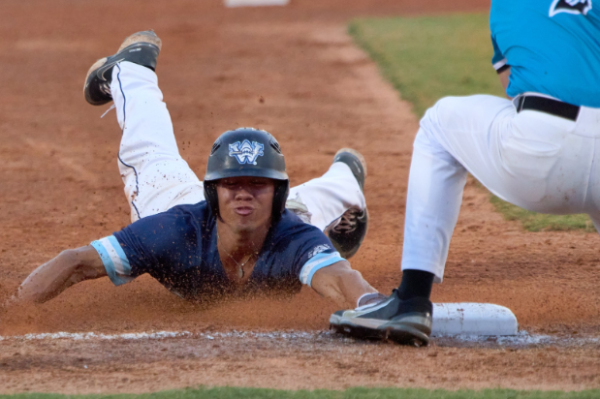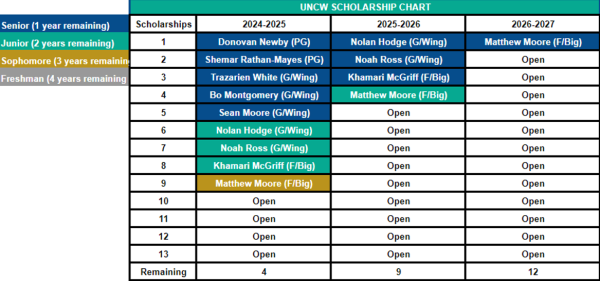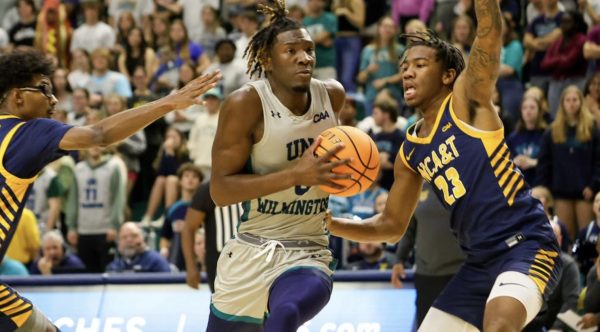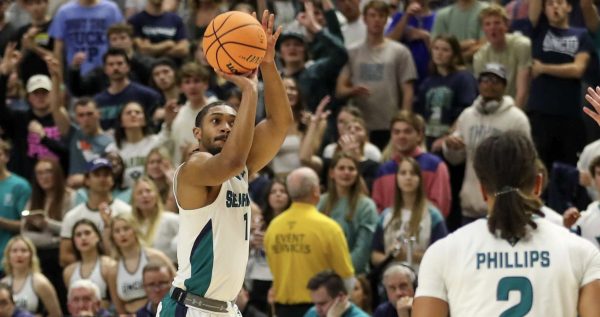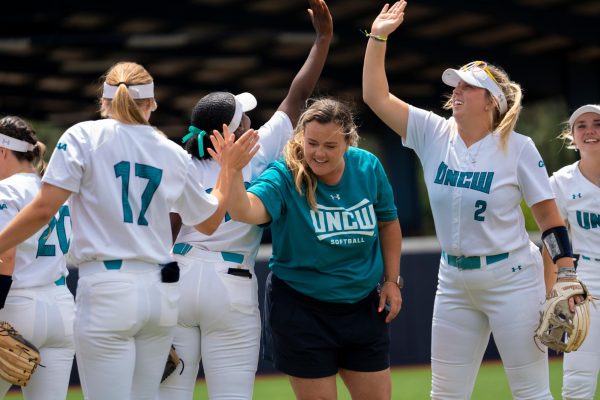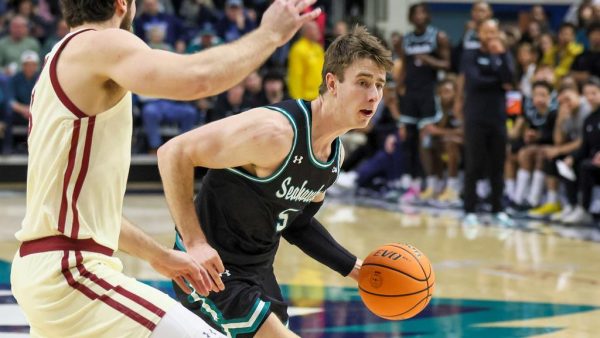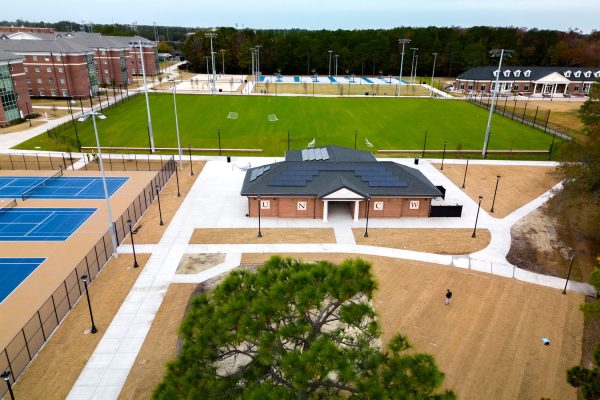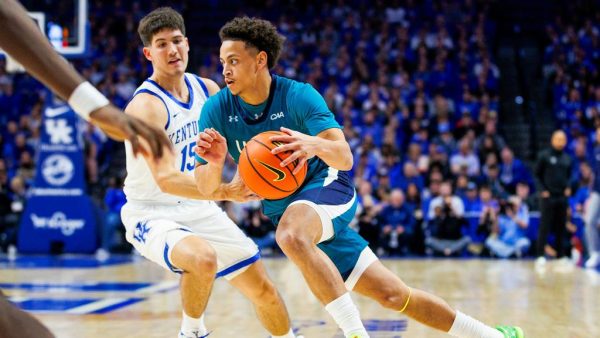Men’s soccer gears up for postseason
November 4, 2014
In 2008, after finishing first in the Colonial Athletic Association and winning their first regular season conference championship, the UNC Wilmington men’s soccer team hosted the conference tournament with the hopes of adding their first CAA Tournament Championship in school history.
Following a first-round bye, the Seahawks played fifth-seeded Northeastern University in the semifinals in a tight match that needed penalty kicks to decide which team advanced.
Northeastern upset the Seahawks en route to the finals, but, for UNCW coach Aidan Heaney, the missed chance at a championship was not a disappointment. After the loss, Heaney remembers saying to his team, “I’m more convinced now that we’re going to win a championship than I ever was.”
It didn’t take long for Heaney’s prophecy to come true. The following season, in 2009, the Seahawks entered the CAA Tournament again as the top-seed after finishing the season 12-2-4. A 1-0 victory over Old Dominion University in the semi-finals set the Seahawks up for a rematch against Northeastern, but this time the outcome wouldn’t be the same.
After playing much of the game without either team scoring, the Seahawks took the lead near the end of regulation and held on for a 1-0 victory for their first CAA Tournament Championship.
In his office, Heaney has an enlarged photo of the 2009 team, and the accomplishment, for him, is one that stands out in a career that includes stints as a professional goalkeeper in the MLS and three CAA Coach-of-the-Year awards.
“I think winning in 2009 was a monkey off the back,” Heaney said. “Seeing it come from the day I walked in for the job, which I got because the program was struggling, was nice. … But seeing that was probably the highlight so far, and this group has a chance to do even better.”
After struggling in the years following UNCW’s CAA Championship before bouncing back last season, this year’s Seahawks are trying to give Heaney another photo to hang in his office.
Entering the CAA Tournament, UNCW has a record of 12-3-2 overall (5-2-1 in the CAA) and finished tied for first with Delaware and Hofstra. Based on a head-to-head tiebreaker, Delaware will host the semifinals and finals as the top-seeded team, but the Seahawks will receive a first-round bye as the second-seeded team.
UNCW’s success has come while playing the toughest schedule of Heaney’s tenure. The Seahawks non-conference schedule included road matches against then-No. 17 University of South Carolina and then-No. 25 Campbell University, and home matches against then-No. 9 UNC-Chapel Hill and then-No. 23 Duke. The Seahawks won all four of those matches, finishing 4-1 against top-25 teams.
UNCW’s sole loss to a ranked opponent came against Delaware in a match decided in double overtime with a little over a minute left to play. For Heaney, the tough schedule helps moving into the pivotal portion of the season.
“I remind them quite regularly when we’re coming into games that this is why we play the tough schedule,” Heaney said. “I set the schedule up thinking that we’ll probably take some bumps along the road, and we’ve had three bumps. I do remind them that they’re better prepared than most of the teams in the country to play these games—they’ve been in games against good opposition, they’ve traveled places where it’s very difficult, like Old Dominion and South Carolina, and going and winning down there it’s tough places to go and win, and the players have done that, so I think it gives them confidence that they’re ready to face a lot of adversity and feel comfortable that they can handle it.”
On the field, a core group of seniors, midfielders Jamie Dell, Mateo Cardona, David Sizemore and defenseman Jacob VanCompernolle, help anchor the Seahawks offensively. Dell leads UNCW with 10 goals, and Cardona has contributed four goals coming off the bench. Sizemore and VanCompernolle have combined for seven assists, helping set up nearly 25 percent of UNCW’s 29 team goals, second-best in the CAA.
“When it comes to goal scoring, that’s the hardest part of the game,” Heaney said. “When you’ve got guys that have played together and have a little bit of subtlety and understanding of some of the nuances and things that other players do, it’s not like you start off from day one trying to figure out, ‘OK, what does he do well? How does he look with that guy?’ You have a good understanding of that, and it’s shone. We’ve scored a lot more goals this season, and that’s been encouraging.”
The team’s defense and goalkeeping have also played an important role. The Seahawks have limited opponents to 14 goals this season, including seven shutouts.
“I really feel like with this group that our defensive record has been so stellar as well,” Heaney said. “I preach to the team that we aren’t winning games because we’re scoring … the results have come because of our group defending. I really feel that we always have goals in the team, but if we don’t defend well, we aren’t going to beat teams 4-3 every week. It’s going to be 2-0, 2-1, 3-2, but we have to do well on the defensive side and use it as a springboard for how we attack.”
UNCW’s on-field success has not gone unnoticed, either. Average attendance this year has nearly doubled from 533 in 2013 to 958 this year, including a record-setting attendance of 2,613 in UNCW’s match against UNC.
Heaney attributes the recent World Cup as a potential reason for the increased interest in soccer, not only on campus, but also across the country. But whatever the reasons for the average attendance doubling, Heaney has welcomed the student body’s support, particularly in the record-setting match against the Tar Heels.
“The really pleasing, exciting thing for me as a coach is how many more students have come out,” Heaney said. “Typically when you get the breakdown of people in the community, the adults and the kids, but the student body has been very receptive and very supportive. I can’t lie it gives me goosebumps to hear them chanting—it was like a proper European soccer game, and the fans were into it and were supporting us…So I think it’s been super for us to see that kind of support coming from our students—that’s kind of what we’ve been hoping for, and it shows what we can do here at UNCW.”
This year’s victory over UNC and other ranked opponents, however, isn’t an anomaly. This is the second year in a row that the Seahawks have beaten both UNC and Duke in the same season, and victories like these play a crucial role in UNCW’s ability to compete and win as a Mid-Major against Power Conference teams.
For Heaney and UNCW, recruiting a player is a meticulous process in which emphasis on one’s soccer abilities is not the area that’s evaluated the most. Instead, Heaney focuses on a potential recruit’s intangibles and how they will mesh with the current players.
“It’s not just the soccer,” Heaney said. “We want good kids, and we want kids who are going to consistently be trying to be good—we can work with that. If it’s a kid who’s really good one day and he’s off the next three games, that doesn’t help us because you don’t know what you’re going to get. Trying to figure out the intangible pieces is the hardest part, so on the front end of recruiting we really try to get to know the kids and try to see what makes them tick. When they come on their visit, we see what the other teammates think of them and see whether they’d fit in and whether they like them and whether they’d be a good addition on the field, so we get good feedback.”
Perennial national championship contenders like UNC have a luxury in recruiting that UNCW and other mid-major schools don’t: a larger pool of elite players from which to choose. For example, last year in UNC’s recruiting class, the Tar Heels brought in a U-18 United States men’s national team player who comes off the bench for UNC.
“I was an assistant at Chapel Hill, so I’ve been on the other side,” Heaney said. “And there’s no recruiting—it’s selecting. We’re recruiting, they pick. And for us, it’s not a negative, and where we are, we just have to work and do things a little differently.”
Despite the limits of recruiting at a mid-major school, Heaney has high expectations for any player he scouts, which stems from the foundation for the program he’s laid over the past 14 seasons.
“I think we’re getting to a point in our program where the guys are coming in and they now understand that that’s what we’re about,” Heaney said. “Going to play at Chapel Hill and Duke and Ohio State and these sweatshirt kind of schools, and we’re going there not just to get the experience, we’re going there with the idea that we’re going to win.”
When this year’s seniors graduate, Heaney will turn to recruiting, trying to find the right guys to fill the voids and the gaps in the roster. What comes next remains unknown because college soccer is a sport of parity, especially in the CAA, which has had 10 different champions in the past 12 years.
But before the seniors leave, they have a chance to cap an already impressive season.
“I would love to see these guys win,” Heaney said. “We really want to win the league. If we don’t win the league, then we want to make the NCAA Tournament, and that’s competing for a national championship with the last 48 teams in the country.”
Despite the parity of college soccer and the reality of players graduating each season, Heaney and his Seahawks have managed to navigate the terrain, carving out a name for the program in the process. Heaney’s vision and goals for the program are less focused on any individual season and more focused on each season being in a position to compete for a championship.
“We’d like to be in that situation every year,” Heaney said. “But that’s not a realistic thing to think that we can—but we’re still going to shoot for it.”













